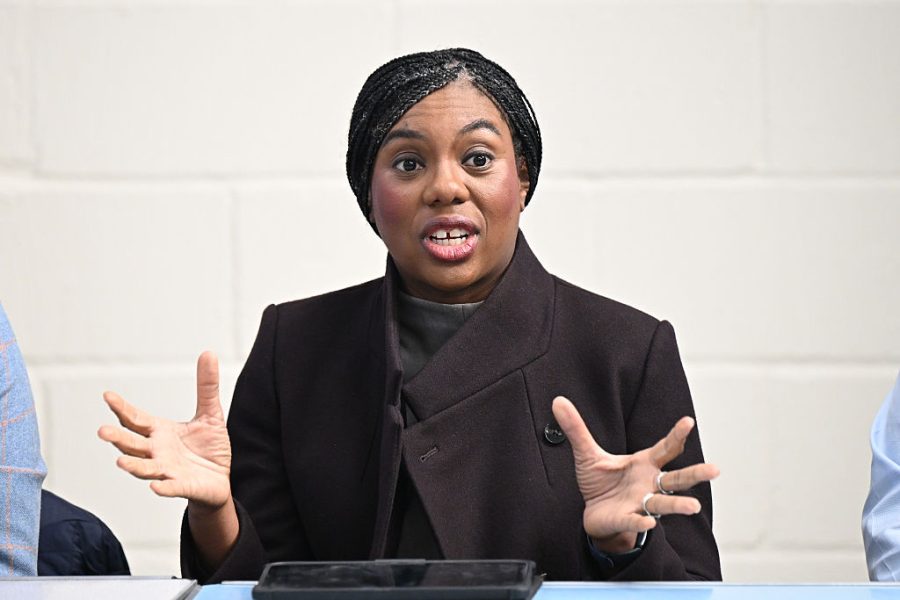The Budget countdown is on, and with just over a week to go until Chancellor Rachel Reeves’s big fiscal statement her political opponents are keen to offer up their (unsolicited) advice. The media had to choose their fighter this morning as Reform’s Nigel Farage was speaking at exactly the same time that Conservative leader Kemi Badenoch took to the podium. The Tories set out their stall on the economy at their party conference in October – and today provided an opportunity for Badenoch and her shadow chancellor Mel Stride to reiterate their message: Labour is hiking taxes to protect benefits. ‘Everything else is a smokescreen,’ Badenoch advised her crowd.
The government is not, of course, going to introduce income tax rises – as the Financial Times reported last week – but the Tories are one step ahead: it is Labour’s ‘stealth tax bombshell’ they focused on this morning. It is widely expected that the Chancellor will freeze tax thresholds for another two years, instead of allowing them to increase in line with inflation. Quoting Reeves to his audience, Stride outlined the significance of this rowback. The Chancellor herself admitted last year that ‘extending the threshold freeze would hurt working people’ – and Labour even pledged in their 2024 manifesto that income tax and national insurance threshold freezes would not be extended. Breaking this commitment should set off alarm bells with voters, the Tories insist.
The Tories have the diagnosis right, but do they have better solutions?
Labour has long claimed that its tough economic decisions are necessary to tackle the black hole left by the previous Conservative administration – and this year, Starmer’s team is keen to claim that Brexit woes have played a part in Reeves’s decision making. Badenoch dismisses this narrative as fanciful storytelling. ‘She will be painted as the heroic victim,’ the Tory leader scoffed. And Badenoch isn’t wrong when she points to some of the Labour-made problems facing the Chancellor ahead of the Budget. There was the chaos of the welfare bill earlier this summer – the U-turn on benefits cuts cost around £5 billion – and the expectation that the two-child benefit cap will be scrapped in some form. Both these measures are expected to cost more than £8 billion – which is the figure the Institute for Fiscal Studies suggests would be raised from extending threshold freezes to 2029/30. ‘In summary, Labour MPs created a new £5 billion hole in the Chancellor’s estimates,’ Badenoch concluded.
So the Tories have the diagnosis right – the Chancellor will struggle to blame these Budget measures on Brexit after the benefits U-turns and breaking a manifesto promise is hardly going to endear Starmer to voters who have long since turned away from him – but do they have better solutions? ‘Fiscal responsibility is at the heart of everything we do,’ Stride claimed today. At the Conservative party conference, he unveiled a host of policies including welfare reform, cutting civil service jobs, making savings from the foreign aid budget, asylum hotels and council housing subsidies. The Tories would keep the two-child benefit cap, something that even Reform is not prepared to do. And they are avowedly pro-business. ‘This is our alternative,’ Badenoch said. ‘Cut spending, cut tax, back business – and get it working again.’
There remain questions about the Conservatives’ stance on other aspects of the economy – namely involving pensioners – given the party claims to be one that prioritises fiscal prudence. The Tories were opposed to Starmer’s initial move to cut universal winter fuel payments (a decision that was quickly reversed) and are against scrapping the pension triple lock. Badenoch insisted today that this stance is not inconsistent with the Tories’ position on fiscal responsibility, and claimed:
The reason why we are now even talking about the triple lock is because there is no growth. If we were growing at 2 or 3 per cent a year, it wouldn’t be an issue. We need to get growth. Doing away with the triple lock does not fix the growth problem.
A cynic might also point out that the Conservatives can hardly afford to lose the silver vote.
But the main message landed well: tough decisions are crucial if Britain’s economy is to get back on its feet and Labour’s inability to stick to its guns have cost it significantly. Backbenchers were left emboldened after their resistance to the welfare bill caused a U-turn in the summer, and despite warnings at the time that the volte face would jeopardise plans to scrap the two child benefit cap, they look likely to get their way on this too. It paints a picture of a government that can’t rely on the support of its huge parliamentary party – and one that has become confused about where its red lines lie. Badenoch may have had a difficult start to the job, but if Reeves’s Budget fails to impress, voters may swivel back to the Tories in their search for strength on the economy.







Comments